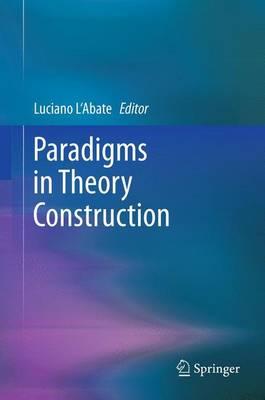Overview
Within the field of psychology there is a proliferation of paradigms, theories, models, and dimensions without an underlying conceptual framework or theory. This conclusion has been reached by representatives of many different psychological specialties. In response to this inconsistency this book presents a hierarchical framework about important theoretical issues that are present in psychological thinking. These issues concern definitions of three major theoretical concepts in theory and practice: (a) paradigms, (b) theories, and (c) models. It focuses on defining, comparing, and contrasting these three conceptual terms. This framework clarifies differences among paradigms, theories, and models, terms which have become increasingly confused in the psychological literature. Paradigms are usually confused with theories or with models while theories are confused with models. Examples of misuses of these terms suggest the need for a hierarchical structure that views paradigms as conceptual constructions overseeing a variety of psychological theories and verifiable models.
Full Product Details
Author: Luciano L'Abate
Publisher: Springer-Verlag New York Inc.
Imprint: Springer-Verlag New York Inc.
Edition: 2012
Dimensions:
Width: 15.50cm
, Height: 2.60cm
, Length: 23.50cm
Weight: 0.869kg
ISBN: 9781461409137
ISBN 10: 1461409136
Pages: 458
Publication Date: 01 December 2011
Audience:
College/higher education
,
Postgraduate, Research & Scholarly
Format: Hardback
Publisher's Status: Active
Availability: Awaiting stock

The supplier is currently out of stock of this item. It will be ordered for you and placed on backorder. Once it does come back in stock, we will ship it out for you.
Author Information
Since his retirement in 1990, Luciano L’Abate, Ph.D. has been Professor Emeritus at Georgia State University where he was previously a Professor of Psychology beginning in 1965. L’Abate has been an editorial board member of many national and foreign professional and scientific journals, as well as a consultant to various publishing houses. He is the author and co-author of over 300 papers, chapters, and book reviews in professional journals in addition to authoring/editing 34 books. His work has been translated into Chinese, Japanese, Finnish, Spanish, French, Polish, and German languages. Dr. L’Abate is the recipient of many awards including ""Family Psychologist of the Year for 1994"" by Division 43 of the American Psychological Association, ""Outstanding Contribution"" by the Georgia Association for Marriage and Family Therapy, and ""Outstanding Citizen"" by the House of Representatives in the State of Georgia. He has also held workshops and lectured extensively in the United States, Australia, Canada, New Zealand, Japan, Germany, Spain, and Italy. Dr. L’Abate has spent the last several years involved full-time in writing and research since his retirement from Georgia State University.




